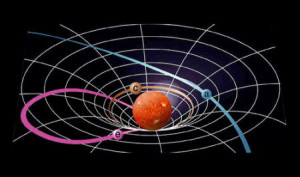 It’s been a hundred years since Einstein published his General Relativity (Gravity) theory. How time flies when your space-time is curved! Many summary articles have appeared, in The New York Times, Science News, and The Economist, to name just a few that have come my way.
It’s been a hundred years since Einstein published his General Relativity (Gravity) theory. How time flies when your space-time is curved! Many summary articles have appeared, in The New York Times, Science News, and The Economist, to name just a few that have come my way.
I’ve always been skeptical of the Theory of Relativity (both theories), not because I’m a hide-bound Newtonian, but because of the slippery language used to express them. The true language of physics is math, and I don’t speak it well enough to communicate (Einstein himself barely did), so I am left with descriptions of the theories in ordinary language, and those I have found lacking.
My concerns could therefore be dismissed as irrelevant, since I am not communicating in mathematics. But that would be unfair, because scientists must be able to explain their work in ordinary language or they risk becoming an echo chamber for specialists, irrelevant themselves. Science is a societal enterprise, supported by the wide society, and scientific ideas must ultimately be communicable to its members. That’s my justification for having an opinion on these matters in ordinary language.
My concerns about relativity arise from two basic points. One, how is it that one man could, using only the power of his imagination, conceive of a cosmology that ultimately turned out to be so useful to so many – and which corresponds so remarkably well with observation of the physical world? It’s not like he was poring over reams of anomalous data and trying to find a least-squares regression line or something else to organize it all. No, he just conceived a universe from whole cloth. How? It’s a psychological question whose answer throws doubts over the special theory, which is foundational for the general theory.
My second issue is about the language and logic of science itself, particularly when it comes to the role of the observer, and indeed the very definition of what it means to “observe” something. This is a question about the nature of human perception, cognition, and epistemology.
When science writers talk about clocks giving different times depending on their motion or gravitational situation, they almost seem to be deliberately hiding the role of the observer with disingenuous language. Clocks do not “give” or “tell” time at all. A human observer must look at the instrument and interpret the reading. So the real issues in time dilation and space-time curvature involve the capacities of the observer, not the performances of clocks and beams of light. The relentlessly objective language seems perversely blind to the reality of the subjective observer. Again, my skepticism boils down to psychological issues.
Do I have alternative ways of thinking about such matters? None that are non-risible to scientific thinking. But since I question the very basis of scientific thinking, objectivity and even the definition of empiricism, foundations that scientists cannot and do not dare examine, my alternative formulations are not crushed by being labeled “unscientific” or “non-mathematical” or “untestable.” Such labels would miss the point of my alternate world-view.
Okay, I admit I’m intimidated by the massively overwhelming social acceptance of scientific epistemology as the gold standard of critical thinking. That’s why I’m not offering my alternative ideas here. I lack an appropriate language for making them understood.
In reading various mini-biographies of Einstein this month, I understand he faced a similar challenge, finding appropriate language to express his ideas. He was fortunate to connect with mathematicians familiar with non-Euclidean geometry and other tools that eventually led him to the expression he sought.
But importantly, Einstein spoke the lingua Franca of physics. He needed only a few bridging sentence structures. The community was already prepared to understand the result (not without some difficulty, it’s true). I, on the other hand, will never be able to express my ideas in the language of science. Perhaps the language of fiction instead will carry me where I want to go.
